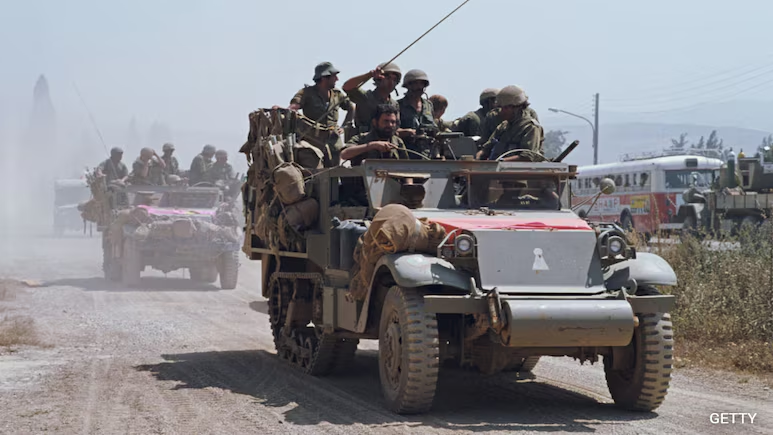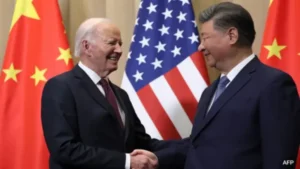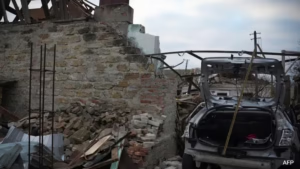
Israeli airstrikes in Lebanon on Monday killed 492 people, including 35 children, in the deadliest attack on the country in nearly two decades. It came just days after thousands of pagers still in use in the country exploded, killing at least 32 people and wounding many others. Lebanon claimed Israel was behind those blasts as well.
Tensions between Israel and the militant group Hezbollah have escalated to unprecedented levels in the past year after Hamas’s October 7 attack. Even though Hezbollah said it had nothing to do with the attack on southern Israel, it has continued to support the militant group in Gaza, where Israeli airstrikes have killed more than 40,000 Palestinians and displaced nearly the entire population.
The Shadow War
The shadow war between Israeli intelligence agencies and Hezbollah dates back more than 40 years. In the early 1980s, Israel invaded Lebanon to overthrow the Palestinian Liberation Organization (PLO). While Israel scored early victories by forcing the PLO to withdraw from Beirut, a devastating incident in November 1982 marked the beginning of Israel’s ongoing struggle against Hezbollah.
In one of the first major blows, a massive explosion destroyed the headquarters of Israel’s internal intelligence service, the Shin Bet, in the city of Tyre, killing 91 people. It turned out that this was one of the first suicide car bombings, carried out by militant Shia Islamists who later formed Hezbollah.
Hezbollah
Founded in 1983 with the support of Iran, Hezbollah soon became one of Israel’s most formidable enemies. Adept at both guerrilla warfare and covert operations, the organization continued its efforts to destabilize Israeli targets both within and outside Lebanon. Hezbollah carried out numerous attacks in the 1980s and 1990s, including the bombing of American and French military barracks in Beirut.
Hezbollah managed to finance its operations through a vast network of supporters, including in South America, which emerged as a key aspect of the shadow war. The organization’s involvement in both legal and illegal activities such as drug trafficking and money laundering enabled it to garner significant resources, which Israel struggled to disrupt.
A prime example of Hezbollah’s global reach occurred in the early 1990s when, after Israeli forces killed Hezbollah leader Abbas al-Musawi, the terrorist group retaliated by bombing the Israeli embassy and a Jewish community center in Buenos Aires, Argentina, killing more than 100 people.
Espionage operations
However, Israel’s spy agency Mossad also remained ruthless. Mossad targeted senior Hezbollah and Iranian operatives involved in planning attacks against Israel in several high-profile assassinations.
The elusive Hezbollah military commander Imad Mughniyeh was a particular target of Israeli intelligence agencies. Mughniyeh is believed to have masterminded several high-profile attacks, including the 1983 bombings in Lebanon, but he eluded capture for decades. It wasn’t until 2008 that the Israeli military, in conjunction with the CIA, succeeded in killing Mughniyeh with a car bomb in Damascus.
Hezbollah retaliated with several attempts to target Israeli embassies and civilians, including a 2012 suicide bus bombing in Bulgaria that killed five Israelis.
This year, in July 2024, Israel successfully eliminated two high-ranking Hezbollah officials, Fuad Shukr and Ibrahim Aqeel. They were involved in 1980s attacks on Israeli forces in Lebanon.
Shadow warfare has not been limited to conventional or guerrilla tactics. One of the most infamous attacks came in the form of the Stuxnet computer virus, a joint Israeli-American campaign that targeted Iran’s nuclear facilities in 2010. This cyberattack, which destroyed centrifuges at Iran’s Natanz facility, was the first known example of a cyber operation causing physical damage.
More recently, Hezbollah and Israel have engaged in a new type of high-tech warfare. In September 2024, Hezbollah acknowledged that the group had suffered serious losses, with pagers and walkie-talkies being blown up. The operation appeared to be the work of Mossad, even though Israel has not officially claimed responsibility.
Hezbollah leader Hassan Nasrallah called Israel’s recent actions a “declaration of war.”

Continuing the achievement of the journey of effectiveness and credibility of more than 10 years in the career of journalism, as a woman journalist, I am Serving as the founder, promoter and editor of DiaryTimes with the trust and support of all. My credible coverage may not have given a big shape to the numbers, but my journey presents articles that make you aware of the exact and meaningful situations of Himachal’s politics, ground issues related to the public, business, tourism and the difficult geographical conditions of the state and financial awareness. DiaryTimes, full of the experience of my precise editorial expertise, is awakening the flame of credible journalism among all of you, so that the eternal flame of meaningful change can be lit in the life of the people of the state and the atrocities being committed against the people can be brought to the fore, I am motivated for that. If even a small change comes with the power of my journalism and the whole world becomes a witness to that issues, then I will consider myself fortunate.








